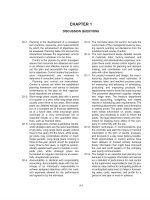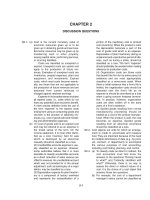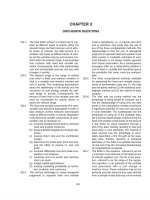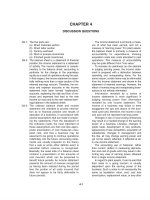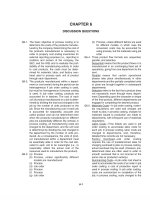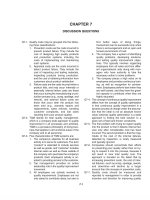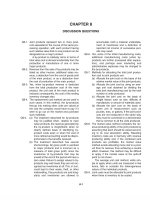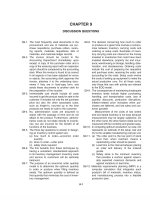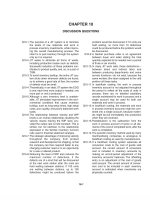Solution manual cost accounting 14e by carter ch05
Bạn đang xem bản rút gọn của tài liệu. Xem và tải ngay bản đầy đủ của tài liệu tại đây (103.84 KB, 22 trang )
To download more slides, ebook, solutions and test bank, visit
CHAPTER 5
DISCUSSION QUESTIONS
Q5-1. The cost attached to a product is an amount
assigned by the costing methods used—an
amount controlled by the circumstances,
assumptions, and limitations of the method
under which it was compiled. Product costs
are composites of historical outlay that have,
perhaps, been modified by estimates or standards, by processes assigning or prorating
expenditures to periods, or by tracing the
direct costs and allocating the indirect costs
to particular products so that the total period
outlay is spread over the aggregate output.
Despite these shortcomings, product costs
are useful in costing inventories, comparing
prices and total unit cost, measuring current
profit or loss, and indicating the minimum cost
below which a sales price cannot go in the
long run. Some confusion will result at times
in using cost information in making management decisions unless information relevant
only to the decision is used.
Q5-2. The primary objective in job order costing is to
determine the cost of materials, labor, and
factory overhead used to produce a specific
order or contract. Cost estimates are made
when the order is taken, and the job order
procedures are designed to reveal costs as
the order goes through production, thereby
giving an opportunity to control costs.
Q5-3. The type of cost accumulation method used
by a company will be determined by the type
of manufacturing operations performed. A
manufacturing company should use process
cost accumulation for product costing purposes when like units are continuously mass
produced; when custom-made or unique
goods are produced, job order costing would
be more appropriate. Process costing is often
used in industries such as chemicals, food
processing, oil, mining, rubber, and electrical
appliances. With a continuous mass production of like units, the center of attention is the
individual process (usually a department).
Q5-4.
Q5-5.
Q5-6.
Q5-7.
Q5-8.
5-1
The unit costs by cost category as well as
total unit cost for each process (department)
are necessary for product costing purposes.
A job order cost sheet is used:
(a) to keep track of the direct materials and
direct labor used on a job plus an appropriate share of factory overhead;
(b) to compare actual costs to estimated
costs;
(c) as a subsidiary ledger for the work in
process account.
The work in process account is a control
account in the general ledger, reflecting total
costs assigned or applied to jobs. The individual job cost sheets form the work in process
account’s subsidiary ledger, indicating the
direct materials, direct labor, and factory overhead charged to each job.
Job order cost sheets serve a control function. Comparisons are made between estimates of job costs and costs actually
accumulated for the job. In addition, cost control is enhanced by accumulating direct materials and labor as well as factory overhead
costs by cost centers or departments, and by
comparing the actual costs to cost center
budgets.
Actual factory overhead consists of the dayby-day costs that are actually experienced
and incurred by the company. Applied factory
overhead is the overhead charged to jobs
based on the predetermined factory overhead
rate. This rate is created by dividing total estimated overhead by total estimated number of
units (or any other appropriate base). The difference between actual and applied factory
overhead is the over- or underapplied factory
overhead.
The characteristic of a service business that
makes likely the use of job order costing is
that all jobs are not alike and cost information
for each job is desired.
To download more slides, ebook, solutions and test bank, visit
5-2
Chapter 5
EXERCISES
E5-1
E5-2
E5-3
(1)
Job 5575
Direct material...............................................................
Direct labor....................................................................
Applied overhead .........................................................
Total job cost .......................................................
$24,070
22,832
10,024
$56,926
Job 5576
Direct material...............................................................
Direct labor....................................................................
Applied overhead .........................................................
Cost to date..........................................................
$ 4,420
2,600
2,000
$ 9,020
The amount of direct labor in finished goods:
Finished goods .............................................................
Materials included in finished goods ($15,500 – $3,200)
Direct labor and factory overhead in finished goods
$37,500
12,300
$25,200
Factory overhead charged to work in process $11, 800
=
= .8
ork in process
$14, 750
Direct labor charged to wo
Let X = direct labor in finished goods
1.8X = $25,200 direct labor and factory overhead in finished goods
X = $14,000 direct labor in finished goods
(2)
E5-4
(1)
The amount of factory overhead in finished goods:
X = $14,000
.8X = .8($14,000)
.8X = $11,200 factory overhead in finished goods
December materials used:
Materials inventory, December 1...............
Materials purchased ................................... $87,000
Freight-in ....................................................
1,500
Materials available ......................................
Materials inventory, December 31.............
$ 8,000
88,500
$96,500
6,500
$90,000
To download more slides, ebook, solutions and test bank, visit
Chapter 5
5-3
E5-4 (Concluded)
(2)
Work in process, December 31:
Per
Unit
Direct materials.........................
$2.40
Direct labor................................
.80
$3.20 × 2,000 units = $6,400
Factory overhead .....................32 machine hrs. @ $100 = 3,200
$9,600
(3)
December cost of goods manufactured:
Materials used (direct) (requirement (1)) ...........................................
Direct labor ...........................................................................................
Factory overhead (600 machine hours @$100) ................................
Total manufacturing cost ....................................................................
Add work in process, December 1:
Direct Material, $2.40 × 3,000
= $7,200
Direct Labor, $.80 × 3,000
= 2,400
Overhead, $100 × 48 machine hours = 4,800
Less work in process, December 31 (requirement (2)) ....................
(4)
(5)
Finished goods, December 31:
Direct materials ..................................................................................
Direct labor .........................................................................................
Factory overhead (60 machine hours @$100) ................................
December cost of goods sold:
Cost of goods manufactured (requirement (3)) ..............................
Add finished goods, December 1 .....................................................
Cost of goods available for sale.......................................................
Less finished goods, December 31 (requirement (4)) ....................
$ 90,000
30,000
60,000
$180,000
14,400
$194,400
9,600
$184,800
$
5,000
3,000
6,000
14,000
$184,800
12,000
$196,800
14,000
$182,800
CGA-Canada (adapted). Reprint with permission.
To download more slides, ebook, solutions and test bank, visit
5-4
Chapter 5
E5-5 Materials:
Beginning inventory ............................................
Purchases.............................................................
Materials available for use..................................
Less ending inventory ........................................
Materials used......................................................
Direct labor (($686 – $326) ÷ 1.6) ................................
Factory overhead ($225 × .6) .......................................
Total manufacturing cost.............................................
Add work in process, beginning inventory................
Less work in process, ending inventory ....................
Cost of goods manufactured ......................................
Add finished goods, beginning inventory..................
Cost of goods available for sale .................................
Less finished goods, ending inventory......................
Cost of goods sold.......................................................
E5-6
(1)
$ 75
336 (1)
$411
85
$326
225 (2)
135
$686
80
$766
30
$736 (3)
90
$826
110
$716 (4)
Materials ......................................................................
Direct labor ..................................................................
Factory overhead:
Molding (1,000 DLH × $2.70)...............................
Decorating ($6,000 × 35%) ..................................
Estimated cost to produce ..........................................
$13,000
15,000
(2)
Materials ......................................................................
Direct labor....................................................................
Estimated prime cost ...................................................
$13,000
15,000
$28,000
(3)
Direct labor....................................................................
Factory overhead ($2,700 + $2,100) ............................
Estimated conversion cost ..........................................
$15,000
4,800
$19,800
(4)
Estimated cost to produce (requirement (1)) ............
Markup ($32,800 × 35%) ...............................................
Bid price ......................................................................
$32,800
11,480
$44,280
2,700
2,100
$32,800
To download more slides, ebook, solutions and test bank, visit
Chapter 5
5-5
E5-7
(1)
KEMP MACHINE WORKS
Job Order Cost Sheet—Job 909
Direct Materials
Date
Issued
Amount
9/14
$ 600
9/20
331
9/22
200
$1,131
(2)
Direct Labor
Date
(Week of)
9/20
9/26
Hours
90
70
Rate
$6.20
7.30
Cost
$ 558
511
Applied Factory Overhead
Date
(Week of)
Hours
Rate
Cost
9/20
10
$80
$800
$1,069
$800
Sales price of Job 909, contracted a markup of 65% of cost:
Direct materials....................................................
$1,131
Direct labor...........................................................
1,069
Applied factory overhead ...................................
800
Total factory cost.................................................
$3,000
Markup 65% of production cost.........................
1,950
Sales price............................................................
$4,950
E5-8
(1)
(2)
(3)
(4)
Credit
Debit
Work in Process (35,000 + 45,000 + 55,000) .............. 135,000
Materials ...............................................................
135,000
Work in Process (45,000 + 40,000 + 35,000) .............. 120,000
Payroll ...................................................................
120,000
Work in Process (36,000 + 32,000 + 28,000) .............. 96,000
Factory Overhead Control ..................................
96,000
Finished Goods (156,000 + 132,000)........................... 288,000
Work in Process...................................................
288,000
To download more slides, ebook, solutions and test bank, visit
5-6
E5-9
Chapter 5
(a)
(b)
(c)
(d)
(e)
(f)
(g)
Materials ............................................................... 35,000
Accounts Payable .......................................
35,000
Work in Process................................................... 8,000
Factory Overhead Control .................................. 2,000
Materials ......................................................
10,000
Payroll ................................................................... 9,400
Accrued Payroll ..........................................
9,400
Work in Process................................................... 7,600
Factory Overhead Control .................................. 1,800
Payroll ..........................................................
9,400
Factory Overhead Control .................................. 1,200
Accumulated Depreciation—
Factory Equipment ......................................
1,200
Work in Process (1,830 × 66 2/3%) .................... 1,220
Applied Factory Overhead.........................
1,220
Finished Goods (1,450 + 1,830 + 1,220) ............ 4,500
Work in Process..........................................
4,500
Factory Overhead Control .................................. 1,250
Accounts Payable .......................................
1,250
Accounts Receivable ..........................................
Sales ............................................................
5,400
5,400
Cost of Goods Sold............................................. 4,500
Finished Goods ..........................................
4,500
E5-10
Materials
Inv.
10,000
WIP
Purch.
138,000
148,000
38,000
Inv.
WIP
Finished Goods
50,000
CGS
300,000
350,000
145,000
110,000
205,000
Work in Process
Inv.
30,000 FG
Materials 110,000
Factory
overhead 90,000
Labor
180,000
410,000
110,000
Cost of Goods Sold
FG
205,000
300,000
CGA-Canada (adapted). Reprint with permission.
To download more slides, ebook, solutions and test bank, visit
Chapter 5
5-7
E5-11
(1)
(2)
Work in Process............................................................ 21,112.50
Materials ...............................................................
Payroll ...................................................................
Applied Factory Overhead..................................
11,250.00
3,945.00
5,917.50
Finished Goods ............................................................
Work in Process...................................................
21,112.50
21,112.50
To download more slides, ebook, solutions and test bank, visit
5-8
Chapter 5
PROBLEMS
P5-1
(1)
(2)
Total cost of work put into process:
Materials ...............................................................
Labor: Grinding (8,000 hrs. × $5.60) .................
Machining (4,600 hrs. × $6) ...................
Factory overhead: Grinding (8,000 hrs. × $6).....
Machining (4,600 hrs. × $8) ..
Cost of goods manufactured:
Total cost of work put into process
(from requirement (1)) .........................................
Work in process, beginning inventory ..............
Work in process, ending inventory....................
(3)
Cost of goods sold:
Cost of goods manufactured
(from requirement (2)) .........................................
Finished goods, beginning inventory................
Finished goods, ending inventory .....................
(4)
(5)
Conversion cost:
Labor: Grinding (8,000 hrs. × $5.60) .................
Machining (4,600 hrs. × $6) ...................
Factory overhead: Grinding (8,000 hrs. × $6).....
Machining (4,600 hrs. × $8) ..
Cost of materials purchased:
Materials put into process ..................................
Add materials, ending inventory ........................
Less materials, beginning inventory .................
$ 60,000
44,800
27,600
48,000
36,800
$217,200
$217,200
15,000
$232,200
17,600
$214,600
$214,600
22,000
$236,600
17,000
$219,600
$ 44,800
27,600
48,000
36,800
$157,200
$ 60,000
18,000
$ 78,000
19,000
$ 59,000
To download more slides, ebook, solutions and test bank, visit
Chapter 5
5-9
P5-2
(1)
Materials
4/1
2,700
Indirect
Purchases 11,550
Material
14,250
Direct
1,755
Material
* $9,705 =
2,790
9,705*
12,495
$2,450 + $970 + $6,285
(Job 207) (Job 204) (Jobs 202, 203, 205, & 206)
Work in process ending inventory consists of jobs 203
Job 203
Direct materials ...........................
($1,480 + $ 555)
Direct labor .................................
( 1,000 + 1,500)
Applied overhead ........................
( 800 *+ 1,200)
Total .......................................
($3,280 + $3,255)
& 206:
Job 206
Total
+ $1,980 = $ 4,015
+ 1,000 = 3,500
+
800 = 2,800
+ $3,780 = $10,315
* Applied overhead is 80% of direct labor cost.
(2)
Work in Process............................................................ 4,850
Materials ...............................................................
Payroll ...................................................................
Applied Overhead................................................
1,250
2,000
1,600
Finished Goods (4,700 + 1,250 + 2,000 + 1,600) ........ 9,550
Work in Process...................................................
9,550
Cost of Goods Sold...................................................... 9,550
Finished Goods ...................................................
9,550
Accounts Receivable ...................................................
Sales .....................................................................
14,325
14,325
To download more slides, ebook, solutions and test bank, visit
5-10
Chapter 5
P5-2 (Concluded)
(3)
Cost of goods manufactured = cost of jobs finished in April.
Job 205:
Direct material ............................
$ 2,500
Direct labor .................................
2,100 (105 direct labor hours × $20)
Applied overhead .......................
1,680 (105 direct labor hours × $16)
Total Job 205...........................
$ 6,280
Job 202 .................................................
Job 204 .................................................
Job 207 .................................................
Total .........................................
(4)
9,550 (see requirement (2))
6,930
5,870
$28,630
Actual overhead (1,375 + 2,500 + 2,700 + 2,790) .......
Applied overhead:
Jobs 202, 203, 205, 206 (330* hours × $16) .......
Job 207 .................................................................
Job 204 ($1,760 – $960) ......................................
Total applied overhead...............................
Underapplied.................................................................
$9,365
$ 5,280
1,520
800
7,600
$1,765
*100 + 75 + 105 + 50
(5)
Jobs 201, 202, and 205 were sold. Their costs are $8,450
$6,280 = $24,280.
Sales ($24,280 × 1.5) ....................................................
Cost of goods sold.......................................................
Underapplied overhead................................................
Gross profit for April ....................................................
+ $9,550 +
$36,420
(24,280)
(1,765)
$10,375
P5-3
Bal.
(i)
Finished Goods
80,000
320,000
400,000
40,000
360,000
Bal.
(c)
(e)
Work in Process
20,000 (i)
150,000
80,000
100,000 *
350,000
30,000
320,000
*$330,000 – $80,000 = $250,000 direct labor and factory overhead. Factory
overhead is 150% of direct labor, therefore, direct labor is $100,000
To download more slides, ebook, solutions and test bank, visit
Chapter 5
5-11
P5-3 (Concluded)
Bal.
(b)
(d)
(f)
Bal.
(a)
Materials
15,000
(e)
100,000
115,000
23,000
Cost of Goods Sold
80,000
12,000
92,000
360,000
Factory Overhead Control
60,000
12,000
75,000
147,000
Applied Factory Overhead
(c)
150,000
Accounts Payable
102,000
Bal.
7,000
100,000
107,000
5,000
(j)
Accrued Payroll
172,000 Bal.
Accounts Receivable
45,000
(h)
480,000
500,000
545,000
65,000
11,000
175,000
186,000
14,000
Sales
(a)
500,000**
**Cost of goods sold is 72% of sales (100% – 28%).
(1)
(2)
(3)
(4)
(5)
(6)
(7)
(8)
Materials purchased—$100,000
Cost of goods sold—$360,000
Finished goods ending inventory—$40,000
Work in process ending inventory—$30,000
Direct labor cost—$100,000
Applied factory overhead—$150,000
Over or underapplied factory overhead—$3,000 overapplied
Closed out to the cost of goods sold account
CGA-Canada (adapted). Reprint with permission.
To download more slides, ebook, solutions and test bank, visit
5-12
Chapter 5
P5-4
(1)
COLUMBUS COMPANY
Cost of Goods Sold Statement
For Month Ended October 31
Materials:
Materials and supplies inventory, Oct. 1 .........
Purchases...........................................................
Materials and supplies available for use.........
Less: Factory supplies used ......... $ 3,950
Materials and supplies
inventory, Oct. 31 .................
31,750
Materials consumed ..........................................
Direct labor .....................................................................
Applied factory overhead ..............................................
Total manufacturing cost...............................................
Add work in process inventory, Oct. 1 .........................
$40,700
24,800
$65,500
35,700
$29,800
18,600
27,450
$75,850
4,070
$79,920
4,440
$75,480
9,800
$85,280
Less work in process inventory, Oct. 31 ......................
Cost of goods manufactured ........................................
Add finished goods inventory, Oct. 1 ...........................
Cost of goods available for sale ...................................
Less finished goods inventory,
Oct. 31 (2,500 units × $3.70)* ............................
Cost of goods sold.........................................................
*Calculations:
Units in finished goods inventory, Oct. 1.....................
Units manufactured .....................................
20,400
Units sold......................................................
(20,700)
Units in finished goods inventory, Oct. 31...................
Cost of goods manufactured $75, 480
=
= $3.70
Units manufactured
20, 400
9,250
$76,030
2,800
(300)
2,500
To download more slides, ebook, solutions and test bank, visit
Chapter 5
5-13
P5-4 (Concluded)
(2)
COLUMBUS COMPANY
Income Statement
For Month Ended October 31
Sales ...................................................................
Less sales returns and allowances .................
Net sales ...........................................................
Less cost of goods sold ...................................
Gross profit ........................................................
Less commercial expenses:
Marketing expense ...................................
Depreciation—building.............................
Depreciation—office equipment..............
Administrative expense ...........................
Depreciation—building.............................
Depreciation—office equipment..............
Income before income tax ................................
(3)
$144,900
1,300
$143,600
76,030
$ 67,570
$25,050
30
16
$19,700
20
24
Amount of over- or underapplied factory overhead:
Actual factory overhead:
Factory overhead paid .............................
$20,100
Indirect materials ......................................
3,950
Depreciation—building.............................
150
Depreciation—machinery and
equipment.........................................
800
Indirect labor .............................................
4,400
Applied factory overhead..................................
Underapplied factory overhead........................
$25,096
19,744
$29,400
27,450
$ 1,950
44,840
$ 22,730
To download more slides, ebook, solutions and test bank, visit
5-14
Chapter 5
P5-5
(1)
LOGANVILLE CANNING COMPANY
Balance Sheet
December 31, 20B
Assets
Current assets:
Cash ...........................................................
Accounts receivable .................................
Inventories:
Finished goods ................................
Work in process ...............................
Materials ...........................................
Prepaid expenses .....................................
Total current assets.........................
Property, plant, and equipment (net) ...............
Total assets ........................................................
$19,000
10,000
$4,000
1,000
2,000
7,000
500
$36,500
26,000
$62,500
Liabilities
Current liabilities ...............................................
$17,500
Stockholders’ Equity
Common stock ...................................................
Retained earnings..............................................
Total stockholders’ equity.................................
Total liabilities and stockholders’ equity.........
$30,000
15,000
45,000
$62,500
To download more slides, ebook, solutions and test bank, visit
Chapter 5
5-15
P5-5 (Concluded)
(2)
LOGANVILLE CANNING COMPANY
Income Statement
For Year Ended December 31, 20B
Sales ..............................................................................
Cost of goods sold:
Materials:
Inventory, January 1.....................................
Purchases .....................................................
Materials available for use...........................
Less inventory, December 31 ......................
Materials consumed.....................................
Direct labor...........................................................
Applied factory overhead ...................................
Total manufacturing cost....................................
Add work in process inventory, January 1 .......
Less work in process inventory, December 31.
Cost of goods manufactured .............................
Add finished goods inventory, January 1 .........
Cost of goods available for sale ........................
Less finished goods inventory, December 31 ..
Cost of goods sold..............................................
Add underapplied factory overhead ..................
Cost of goods sold—adjusted ...........................
Gross profit ...................................................................
Less commercial expenses:
Marketing expense ..............................................
Administrative expense ......................................
Income before income tax ...........................................
$60,000
$ 4,000
15,000
$19,000
2,000
$17,000
9,000
9,000
$35,000
2,000
$37,000
1,000
$36,000
6,000
$42,000
4,000
$38,000
2,000
40,000
$20,000
$ 6,000
9,000
15,000
$ 5,000
To download more slides, ebook, solutions and test bank, visit
5-16
Chapter 5
P5-6
(1) and (2)
JUAREZ INC.
Job Order Cost Sheets To Post Beginning Inventory Data
March 1, 20–
Materials ..............
Labor ....................
Factory Overhead
Total .........
(b) M.........
(c) M .........
(f) L..........
(h) OH ......
Total .........
(j)
Job 621
$ 2,800
2,100
1,680
$ 6,580
5,300
6,420
5,136
$23,436
Completed and transferred
to warehouse
Job 622
$ 3,400
2,700
2,160
$ 8,260
7,400
(400)
8,160
6,528
$29,948
Completed and transferred to warehouse
(2)
(a)
(b)
(c)
(d)
(e)
(f)
(g)
Materials ...............................................................
Accounts Payable .......................................
Job 623
$ 1,800
1,350
1,080
$ 4,230
5,900
6,320
5,056
$21,506
Still in
process
Dr.
19,000.00
Cr.
19,000.00
Work in Process...................................................
Factory Overhead Control ..................................
Materials .....................................................
18,600.00
2,400.00
Materials ...............................................................
Work in Process ........................................
Factory Overhead Control ........................
600.00
Accounts Payable ...............................................
Materials .....................................................
800.00
Payroll ...................................................................
Accrued Payroll ..........................................
38,000.00
Work in Process...................................................
Factory Overhead Control ..................................
Marketing Expenses Control ..............................
Administrative Expenses Control ......................
Payroll .........................................................
20,900.00
7,600.00
5,700.00
3,800.00
Factory Overhead Control ..................................
Accounts Payable .......................................
Accumulated Depreciation—Factory
Building & Equipment .......................
Prepaid Insurance ......................................
9,404.50
21,000.00
400.00
200.00
800.00
38,000.00
38,000.00
7,154.50
2,000.00
250.00
To download more slides, ebook, solutions and test bank, visit
Chapter 5
5-17
P5-6 (Concluded)
(h)
(i)
(j)
(k)
Work in Process...................................................
Factory Overhead Control (or Applied
Factory Overhead) .................................
Dr.
16,720.00
Cr.
16,720.00
Finished Goods ...................................................
Work in Process ........................................
53,384.00
Accounts Receivable ..........................................
Sales ............................................................
Cost of Goods Sold.............................................
Finished Goods ..........................................
74,738.00*
Cash ......................................................................
Accounts Receivable .................................
69,450.00
53,384.00
74,738.00
53,384.00
53,384.00
69,450.00
* ($53,384 × 40%) + $53,384 = $74,738
Materials
3/1 Bal.
17,000
(b)
(a)
19,000
(d)
(c)
600
36,600
14,800
Finished Goods
3/1 Bal.
15,000
(j)
(i)
53,384
68,384
15,000
21,000
800
21,800
3/1
(b)
(f)
(h)
Work in Process
Bal.
19,070 (c)
18,600 (i)
20,900
16,720
75,290
21,506
400
53,384
53,784
53,384
(3)
JUAREZ INC.
Schedule of Inventories, March 31
Materials ............................................................................................................
Work in Process (Job 623)...............................................................................
Finished Goods ................................................................................................
Total ...................................................................................................................
$14,800
21,506
15,000
$51,306
To download more slides, ebook, solutions and test bank, visit
5-18
Chapter 5
P5-7
(1) and (3)
(g)
Accounts Receivable
117,500.00
Materials
3/1 Bal. 66,300.00 (d)
(a)
41,000.00
(b)
5,800.00 *
113,100.00
59,370.00
Finished Goods
3/1 Bal.
78,830.00
(g)
94,501.65
(g)
94,501.65
173,331.65
78,830.00
3/1
(c)
(d)
(f)
(g)
(c)
(e)
Accounts Payable
(a)
(b)
Work in Process
Bal. 292,621.00
(g)
94,501.65
98,884.00
53,730.00
30,200.15
475,435.15
380,933.50
Cost of Goods Sold
94,501.65
Factory Overhead Control
12,480.00
(f)
30,200.15
28,461.87
(3)
10,741.72
40,941.87
40,941.87
Various Credits
(e)
28,461.87
Sales
(g)
Accrued Payroll
(c)
(c)
(f)
(3)
Payroll
111,364.00 (c)
53,730.00
41,000.00
5,800.00
48,100.00
111,364.00
111,364.00
Applied Factory Overhead
30,200.15 (f)
30,200.15
Over- or Underapplied
Factory Overhead
10,741.72 3/1 Bal.
12,300.00
1,558.28
117,500.00
*$5,800 could also be posted directly to the work in process account, reducing entry
(d) to $47,930.
To download more slides, ebook, solutions and test bank, visit
Chapter 5
5-19
P5-7 (Concluded)
(2)
The total cost of each job at the end of March:
Direct materials .......
Direct labor ..............
Factory overhead ....
Total cost .................
Job 204
Job 205
$15,230.00
9,480.00
$ 40,450
11,320
21,430.00
26,844.00
13,800.00
7,717.65*
$94,501.65
Job 206
Job 207
Total
$ 60,875.00
10,490.00
$16,640
5,800
$170,285.00
55,240
22,750
43,860.00
28,920.00
20,370
219,414.00
22,370
7,475
19,366.00
8,314.50
6,693
85,736.15
$159,605
$171,825.50
$49,503
$475,435.15
The balance in the work in process account
(Jobs 205, 206, and 207).........................................................................
$380,933.50
* 3,355.5 hours × $2.30 = $7,717.65
P5-8
(2)
(a)
(b)
(c)
(d)
(e)
(f)
Materials ...............................................................
Accounts Payable .......................................
Dr.
115,020
Cr.
115,020
Payroll ...................................................................
Accrued Payroll ..........................................
110,000
Work in Process...................................................
Factory Overhead Control ..................................
Marketing and Administrative Expenses ..........
Payroll ..........................................................
78,000
12,000
20,000
Work in Process...................................................
Factory Overhead Control ..................................
Materials .....................................................
108,175
7,520
Work in Process...................................................
Applied Factory Overhead ........................
42,750
Cost of Goods Sold.............................................
Work in Process ........................................
190,350
Accounts Receivable ..........................................
Sales ............................................................
255,000
110,000
110,000
115,695
42,750
190,350
255,000
To download more slides, ebook, solutions and test bank, visit
5-20
Chapter 5
P5-8 (Continued)
(g)
(h)
Cash ......................................................................
Sales Discounts...................................................
Accounts Receivable .................................
247,000
13,000
Marketing and Administrative Expenses ..........
Factory Overhead Control ..................................
Cash ............................................................
Accumulated Depreciation—Machinery ...
15,000
24,680
Accounts Payable ................................................
Cash ............................................................
85,000
Applied Factory Overhead..................................
Factory Overhead Control ........................
42,750
Cost of Goods Sold.............................................
Factory Overhead Control .........................
1,450
(i)
(j)
(1) and (3)
1/1 Bal.
(g)
37,680
2,000
85,000
42,750
1,450
GENERAL LEDGER
Cash
47,000
(h)
247,000
(i)
294,000
37,680
85,000
1/1 Bal.
(a)
122,680
Accounts Receivable
50,000
(g)
260,000
255,000
Materials
21,500 (d)
115,020
115,695
136,520
20,825
171,320
1/1 Bal.
(f)
260,000
1/1 Bal.
Machinery
45,300
305,000
45,000
Accumulated Depreciation—
Machinery
1/1 Bal.
10,000
(h)
2,000
Finished Goods
32,500
1 /1 Bal.
12,000
1/1 Bal.
(c)
(d)
(e)
Work in Process
7,500
(f)
78,000
108,175
42,750
236,425
46,075
190,350
(i)
Accounts Payable
85,000 1/1 Bal.
(a)
58,875
115,020
173,895
88,895
To download more slides, ebook, solutions and test bank, visit
Chapter 5
5-21
P5-8 (Continued)
Accrued Payroll
(b)
(b)
Payroll
110,000
(c)
Sales
(f)
110,000
110,000
(c)
(d)
(h)
Factory Overhead Control
12,000 (j)
7,520 (j)
24,680
255,000
42,750
1,450
44,200
44,200
Retained Earnings
1/1 Bal.
(g)
Sales Discounts
13,000
(f)
(i)
Cost of Goods Sold
190,350
1,450
34,925
(j)
Applied Factory Overhead
42,750 (e)
42,750
Marketing and Administrative Expenses
(c)
20,000
(h)
15,000
191,800
35,000
Common Stock
1/1 Bal.
100,000
WORK IN PROCESS SUBSIDIARY LEDGER
Job 101
1/1 Bal.-Mat.
1/1 Bal.-Lab.
1/1 Bal.-OH
(c) Labor
(d) Materials
(e) Overhead
2,500
2,000
1,000
20,000
51,600
11,250
(f)
Job 103
88,350
46,075
88,350
Job 102
1/1 Bal.-Mat
1/1 Bal.-Lab
1/1 Bal.-OH
(c) Labor
(d) Materials
(e) Overhead
600
1,000
400
40,000
42,000
18,000
102,000
(c) Labor
18,000
(d) Materials 14,575
(e) Overhead 13,500
(f)
102,000
To download more slides, ebook, solutions and test bank, visit
5-22
Chapter 5
P5-8 (Concluded)
(4)
JACKSON COMPANY
Trial Balance
January 31
Cash ...........................................................................................
Accounts Receivable ................................................................
Finished Goods .........................................................................
Work in Process ........................................................................
Materials.....................................................................................
Machinery ..................................................................................
Accumulated Depreciation—Machinery .................................
Accounts Payable......................................................................
Accrued Payroll .........................................................................
Common Stock..........................................................................
Retained Earnings.....................................................................
Marketing and Administrative Expenses................................
Sales ...........................................................................................
Sales Discounts ........................................................................
Cost of Goods Sold ..................................................................
(5)
171,320
45,000
32,500
46,075
20,825
45,300
12,000
88,895
110,000
100,000
34,925
35,000
255,000
13,000
191,800
600,820
600,820
JACKSON COMPANY
Cost of Goods Sold Statement
For Month Ended January 31
Direct materials used................................................................
Direct labor ...............................................................................
Applied factory overhead ........................................................
Total manufacturing cost at normal .......................................
Add work in process inventory, January 1 .............................
Less work in process inventory, January 31 .........................
Cost of goods sold ...................................................................
Add underapplied factory overhead ......................................
Cost of goods sold—adjusted .................................................
$108,175
78,000
42,750
$228,925
7,500
$236,425
46,075
$190,350
1,450
$191,800
